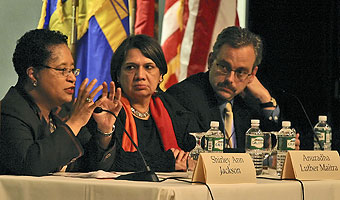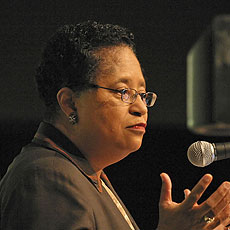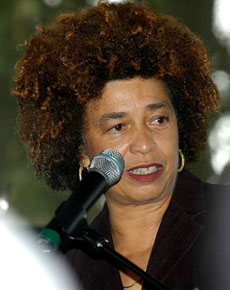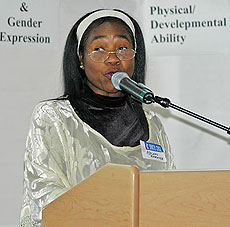November 7, 2005
University president Shirley Ann Jackson, campus community discuss importance of diversity

Keynote speaker Shirley Ann Jackson, left, took part in a panel discussion following her address that included UC Santa Cruz Foundation president Anuradha Luther Maitra and Manuel Pastor,
professor of Latin American and Latino studies.
Photo: Matt Fitt
|
By Louise Donahue
To Shirley Ann Jackson, nothing less than the future of the nation is at stake as campuses and the nation grapple with issues of diversity and excellence.

Keynote speaker Shirley Ann Jackson received the UC Santa Cruz Foundation Medal.
Photo: Matt Fitt |
 Angela Davis, professor of history of consciousness, offered remarks at the Friday session of the symposium. Angela Davis, professor of history of consciousness, offered remarks at the Friday session of the symposium.
Photo: Jim MacKenzie |
 Adilah Barnes shared how her diversity has been part of her life. Adilah Barnes shared how her diversity has been part of her life.
Photo: Jim MacKenzie |
“We must mine the talent pool—globally and nationally,” said Jackson, president of Rensselaer Polytechnic Institute in Troy, N.Y.
Jackson delivered the keynote address on the first day of the Achieving Excellence Through Diversity symposium, on Thursday and Friday, part of the celebration of the investiture of Denice D. Denton as UCSC's ninth chancellor.
Before her talk, UC Santa Cruz Foundation president Anuradha Luther Maitra presented Jackson with the third UC Santa Cruz Foundation Medal, recognizing individuals whose achievements illustrate the ideals and vision of UCSC.
A physicist who headed the Nuclear Regulatory Commission from 1995 to 1999, Jackson said the lack of diversity in science and engineering is especially critical. The United States is seeing a slowdown in its skilled labor force just as other nations are increasing their investment in education, she observed. “These trends threaten our global leadership and our national security.”
“I speak frequently about innovation and discovery,” Jackson said. “Innovation to meet challenges is enhanced by diversity.” History is full of examples of converging cultures bringing about discoveries and advances that benefit mankind, she said.
Jackson served on the National Academy of Sciences committee that recently issued a report on American competitiveness in a changing global environment, “Rising Above The Gathering Storm: Energizing and Employing America for a Brighter Economic Future.” She also serves on several corporate boards of directors.
Jackson said American corporations have already recognized the benefits of diversity. “Corporations, in large part, do not need convincing. Corporations are embracing diversity because it is essential to maintain their market edge.”
Higher education is another story, she said. “It is the universities many times where I find the greatest resistance to change.”
Jackson cited successful campus strategies, such as slowing the tenure clock to promote a more family-friendly atmosphere and creating “critical clusters” to attract women and underrepresented minorities.
“The issue of faculty searches is a critical one,” she said, adding that she is very involved in faculty searches at Rensselaer. “This is where so many women and so many minorities never see the light of day.”
Jackson urged the campus to move beyond simply adding people from different backgrounds, however. “Just throwing people together does not necessarily inspire innovation,” she said, suggesting that a sense of community as well as leadership and excellence were required.
She also encouraged the audience to talk about diversity. “Diversity and discussions of it can be turbulent, messy, and uncomfortable,” she said, “but they can also be illuminating.”
A panel discussion following the speech reinforced the call for dialogue. Jackson joined the panel, composed of Neferti Tadiar, associate professor of history of consciousness; Manuel Pastor, professor of Latin American and Latino studies; and Luther Maitra, who is CEO of Floreat, Inc., as well as president of the UC Santa Cruz Foundation.
Talking about diversity can be hard, Pastor said, but “that is the only way we’ll come to the real common ground in the future.”
Fielding questions from the audience, panelists were encouraged to continue the dialogue, especially by participating in a series of diversity forums beginning today. (See Currents story)
California is on the cutting edge of rapid demographic change—it became a “majority minority” state in 1999—but “California is also at the cutting-edge of inequality,” Pastor said. “The University of California has a big role in addressing these inequalities by opening up the system,” he added.
Tadiar noted that while in some ways the world seems smaller than ever, “devastating gulfs” between continents and even neighborhoods persist.
Panelists also offered their own takes on the symposium theme of “Excellence Through Diversity.”
“I always think about diversity through excellence,” said Pastor.
The key question is not excellence through diversity, said Maitra, but “how do we get to diversity through excellence?”
The questions and ideas kept coming on the second day of the symposium, as students, staff, and faculty gathered at the University Center for breakout sessions on three topics related to diversity.
In opening remarks, Angela Davis shared some ambivalence over Rosa Parks’s casket being viewed in the U.S. Capitol Building. Davis, who grew up in Alabama not far from the civil rights icon, said some Americans see the Rosa Parks story as a symbol that racial divides are a thing of the past. “Her story is one of discrimination overcome, of wrongs righted, of democracy triumphant,” Davis said, but the struggle continues.
UCSC alumnus and actress Adilah Barnes, who portrays Angela Davis as part of a one-woman show, recalled that she was bused across town to a mostly white school as a child in California. “The byproduct of diversity in that situation was acceptance. It was not my skin color that mattered most, but my character,” Barnes said.
“Diversity is something I’ve fought for, and been a recipient of, all my life,” she said. “I urge you all to keep the dialogue going after this week and to become agents of change on this campus.”
Chancellor Denice D. Denton also urged the audience not to shy away from talking about diversity. “We don’t learn without engaging in difficult, challenging, discussions,” she said.
The gathering then split into three groups. The first, “What is Diversity? Thinking at the Edge,” was led by Student Union Assembly Diversity Officer Takita Salisberry; astronomy graduate student Kirsten Howley; and Andrea Monroe of the Equal Employment Opportunity/Affirmative Action Office. Summarizing the discussion later to the entire group, Salisberry said they discussed what diversity means, including such categories as age, race, and class, and put the greatest emphasis on race and ethnicity. The group also encouraged a wider conversation over issues of diversity.
The second session, “Teaching to a Diverse Student Body,” looked at what goes on in the classroom, from sharing knowledge to helping students feel comfortable to participate. Activities outside the classroom were also supported, as part of a way to encourage students not to become too focused on their own areas of study. Such structural issues as financial aid and ethnic studies were explored, and opportunities for student involvement in the diversity dialogue were endorsed. Francisco Hernandez, vice chancellor of Student Affairs, offered opening remarks, and Ruth Harris-Barnett, director of the Center for Teaching Excellence, was the facilitator.
The third session, “Update on the UC Faculty Diversity Study,” was led by UC President Robert C. Dynes and Lisa Sloan, vice provost and dean of Graduate Studies. It offered an early look at some of the figures on faculty diversity that are part of the UC President’s Task Force on Faculty Diversity. (See Currents story.
Summing up, symposium chair William Ladusaw encouraged students, staff, faculty, and administrators to continue to discuss the issues raised at the symposium. “It needs to become the normal operating process. We need to grow routinely comfortable with the discomfort.”
Watch video of symposium, investiture
 Email this story
Email this story
 Printer-friendly version
Printer-friendly version
 Return to Front Page
Return to Front Page